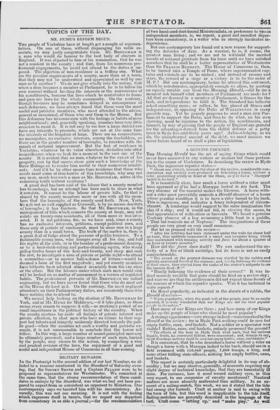TOPICS OF THE DAY, MR. HUME'S REFORM BEGUN.
THE people of Yorkshire have at length got a couple of represen- tatives. On one of these, without disparaging his noble as- .sociate, we may justly congratulate them. Mr. BROUGHAM is a man who would do honour to the best body of electors in England. It was objected to him at his nomination, that he was not a resident in the county ; and that, from his numerous pro- fessional engagements, he could not attend to the duties it im- posed. • The objection of non-residence is a trifling one. What are the peculiar requirements of a county, more than of a town, that they may not be understood and appreciated as well by one man as by another? We do not give wholly into the notion, that when a man becomes a member of Parliament, he is to follow his own counsel without heeding the interests or the convenience of his constituents, because the laws which he contributes to frame and pass are laws for the whole community. On the contrary, though business may be sometimes delayed in consequence of such deference, we have always found that those were the most useful and patriotic members, who most attended to the advice, general or occasional, of those who sent them to the House. But this deference has no connexion with the feelings or habits of mere neighbourhood ; and, generally speaking, counties have very little occasion to exact it. It is not easy to see how a large district can have any interests to promote, which are not at the same time the interests of the kingdom at large. There are no corporations, no monopolies, no exclusive interests, among the freeholders, as there are in the greater number of boroughs, among interfere with the march of national improvement. But the fact of residence in Yorkshire, whatever be its value elsewhere, dwindles into utter insignificance when we look for a moment to the vast size of the county. It is evident that no man, whatever be the extent of his property, can by that means alone vain such a knowledge of the three Ridings as to render him useful to their numerous inhabit- ants. And it be by other means than residence that those who reside must come at nine-tenths of this knowledge, why may not any man, much less such a man as Mr. BROUGHAM, arrive at the remaining tenth without residence ? A great deal has been said of the labour that a county member has to undergo, but no attempt has been made to show in what it consists. It cannot be the labour of private bills, for that is shared by the county members more or less with all the mem- bers that the boroughs of the county send forth. Now, York, uarh not so well supplied as Cornwall, is by no means destitute, of boroughs ; it has thirteen. So that Mr. BROUGHAM, in thes management of bills which concern the county at large,.. may cal- 'ciilate on twenty-nine assistants, all of them more or less inter- ested. It is not petitions, for, as we have said, since a county has no exclusive interests, petitions, except political ones, and these only at periods of excitement, must be more rare in a large county than in a small town. The truth of the matter is, there is a great deal of fudge about the pressure of public business. To a fashionable young man, who lounges away all his day, and half his nights at the club, or in the boudoir of a professional demirep, or to a beef-steak-eating and porter-drinking squire, who would gallop twelve hours of the four-and-twenty, and sleep and soak the rest, to investigate a case of private or public right—to attend a committee—or to answer half-a-dozen of letters—would be deemed a bore of the first magnitude ; and yet county members have hitherto been selected almost invariably from the one class or the other. But the labours under which such men would sink be looked on as matter of amusement to a nerson of regulated habits. The professional pursuits of Mr. BROUGHAM are indeed engrossing, but we have never found that those who do most out of the House do least in it. On the contrary, the most negligent attendants on their Parliamentary duties, are commonly those who have nothing else to attend to. We cannot help looking on the election of Mr. BROUGHAM for York, and of Mr. HUMS for Middlesex,—if it take place, as there seems every reason to suppose it will,—as marking a period of no small importance in the political history of the country. When the county electors lay aside all feelings of private interest and private affection, to elect men who have no claims to their sup- port but talents and integrity uniformly directed towards the pub- lic good—when the counties set such a worthy and patriotic ex- ample, it is not unreasonable to conclude that the towns will follow. In this way, a large number of sound-principled men may be ultimately procured; and a large number of such men, backed by the people, may ensure to the nation, by compelling a wise and prudent revision of the laws, the enjoyment of a good and useful and independent House of Commons in all time coming.


























 Previous page
Previous page